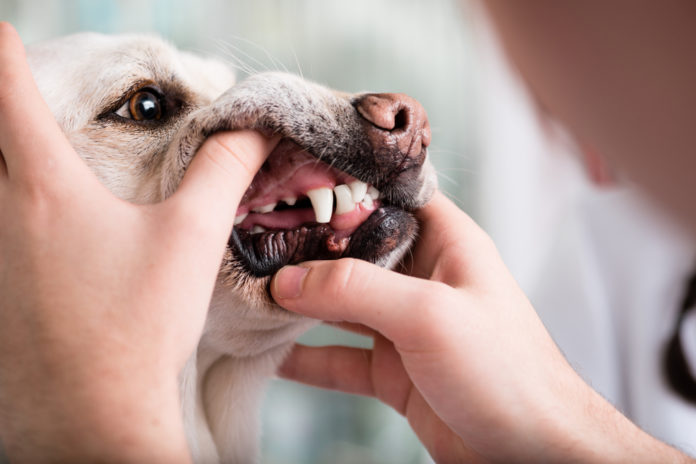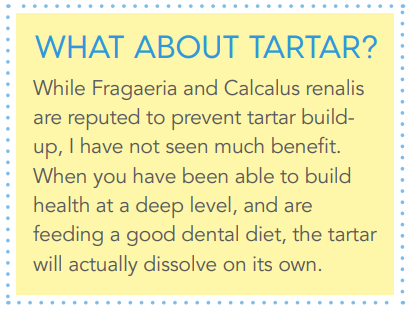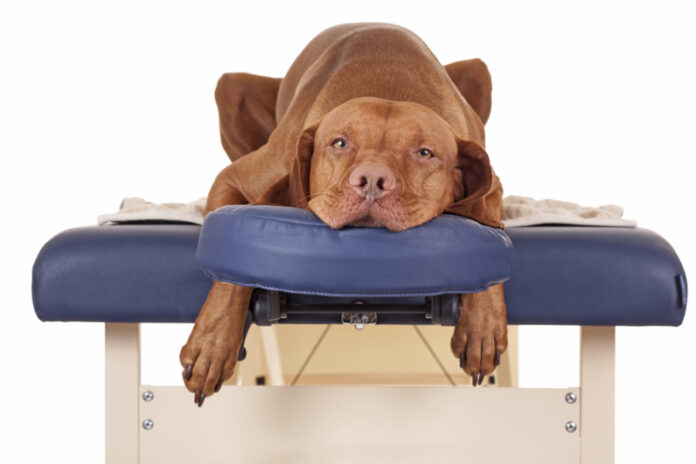Homeopathic help for your dog or cat’s dental problems

Discover how homeopathy can help treat dental problems in your canine or feline companion.
The health of your dog or cat’s teeth and gums is vital to his quality of life. The pain and discomfort caused by inflamed gums and bad teeth can make him miserable. The good news is that there are many ways to help alleviate dental problems, and protect the health of his teeth and gums. This article focuses on how carefully prescribed, individualized homeopathic remedies can be an effective solution to dental problems.
The selection of a homeopathic medicine is based on the theory of “like cures like”. Remedies are chosen based on how they match the animal’s symptoms. When done correctly, a state of complete health can be regained. If you’re considering homeopathy for your dog or cat’s dental issues (or any other condition), it’s important to work with an experienced homeopathic veterinarian – there are 4,000 remedies, and if they are not used correctly, the symptoms may not resolve, or may return. Homeopathic remedies can be purchased at most health food and pet health stores, or bought online. The most common potency is a 30c. Ignore everything on the label except the name of the remedy and its potency.
Dental problems and matching homeopathic remedies
- Pain, bleeding, and after dental work: Aconitum napellus, Arnica montana, Arsenicum album, Belladonna, Hypericum, Ipecacuanha, Lachesis, Phosphorus, Staphysagria
- Abscess: Calcarea carbonica, Hepar sulphuricum, Mercurius solubilis, Phosphorus, Silicea
A tooth root abscess causes swelling of the cheek and is usually treated by removing the tooth, which is often a big molar that needs major surgery. If an abscess has just been diagnosed and your dog or cat is not in too much pain, you could try one of the following remedies, or schedule a phone appointment with a veterinary homeopath. These medicines can also help with smaller abscesses that can be seen on the gums, or from an injury.
- Gum disease – gingivitis, stomatitis: Aconite, Belladonna, Lachesis, Hepar sulphuricum, Lachesis, Mercurius solubilis, Phosphorus
 Gum problems usually indicate a fairly serious imbalance, so you may start with one of these medicines while scheduling an appointment with a veterinary homeopath. Well prescribed homeopathic medicines have allowed many cats to keep their teeth, even with severe stomatitis.
Gum problems usually indicate a fairly serious imbalance, so you may start with one of these medicines while scheduling an appointment with a veterinary homeopath. Well prescribed homeopathic medicines have allowed many cats to keep their teeth, even with severe stomatitis.
As you can see, the same medicines can help different conditions. When they match the energetic pattern of the ill animal, they restore balance and allow self-healing. It’s important to realize that homeopathic remedies are selected for their general characteristics, not just for the specific medical condition – more on this below.
 The remedies in detail
The remedies in detail
Aconitum napellus – First to give if there is great fear, fever, anxiety, or shock. These states could be caused by an injury, breaking a tooth on a rock, or coming home after surgery. Gums can be swollen. Pain is worse with cold food or drink. Worse at night and in cold, dry weather.
Arnica montana – First to give for any trauma, if there is no fear and terror. It can control bleeding, bruising, and pain in the mouth tissues. Animals needing Arnica (injury, broken tooth, sore gums, any pain) are so sensitive to pain that they do not want you to come near them. After a dose of Arnica, they may be easier to examine and treat.
Arsenic album – Chosen for toothaches that are worse at night, especially between midnight and 2 A.M, and that are relieved by warm water. Your cat or dog may be restless, even when lying down. These animals are often more thirsty, especially for small sips of water. They usually seek heat.
Belladonna – Pain is severe, burning and throbbing. It’s worse at night, worse on contact (as when chewing food or toys), and in the open air. Fever may be present. Hairless areas of the body, including the mouth and gums, seem flushed and very red. Behavior may be excitable and even aggressive.
Calcarea carbonica – Young dogs and cats often need this remedy. They are usually plump, round, sweet animals who can be very stubborn, sluggish, and phlegmatic. Cats may lick you when petted. A red flag that this medicine is needed is when these animals eat litter, dirt, or other indigestible substances. Wet weather makes them feel worse.
Hepar sulphuricum – These animals are very sensitive, so exhibit a lot of pain, and can be grouchy and snappish. They are very chilly.
Hypericum perforatum – Excellent for any problems in nerve-rich areas, including the teeth and gums. If your cat or dog acts as if he is experiencing a stinging or sharp pain, yet is fine when you touch and examine him, or if he is still painful after the Arnica, reach for Hypericum. If he has never shown an aversion to being touched or approached, you could start with Hypericum rather than Arnica.

Ipecacuanha – For gushing bright red bleeding from the gums. Give this remedy on your way to the veterinary clinic.
Lachesis – The blood is a dark, even purple color. Gums are swollen and have a dusky color. The animal feels worse in hot weather and hot rooms. The rabies vaccine can be the trigger for problems that will resolve with Lachesis. It is always good, when your dog or cat becomes ill in any way, to see if it started after a vaccine or drug treatment. Problems tend to be on the left side of the animal, or start on the left and then move to the right. Often, he will not want any collar or pressure on his neck and throat.
Mercurius solubilis – Copious salivation is very common when this remedy is needed, as are really putrid odors of the mouth, saliva, and even feces or vomit. Lots of straining before, during, or after trying to defecate, even when stools are fairly normal. Animals needing Mercurius cannot tolerate temperatures that are too hot or too cold.
Phosphorus — Excellent for stopping bleeding, especially when the blood is bright red. This could occur after dental surgery, or because the animal chewed too vigorously on a stick, or suffered another injury. Animals needing Phosphorus often love company, like to play, enjoy petting, are thirsty for cold water, and may be sensitive to noises. The anus is often gaping open.
Pulsatilla – Cold water or ice cubes seem to relieve gum pain in these animals, and they feel better in general in cold, open air. They are super clingy, need a lot of reassurance, and the pain is lessened when cuddled. They stop wanting to drink water, or drink a lot less. If you see discharge from an abscess it would be a creamy color with no odor.
Silicea — Abscesses around the roots of the teeth and gums often need Silicea. The pain is worse from drinking cold water. These animals are often timid or fearful, and problems can arise after vaccination. Silicea is often needed for chronic problems that just are not completely healing. It can help expel splinters or plant awns from gums (or other areas).
Staphysagria – If incisions were made during dentistry, or there was an injury such as a cut, note if there has been a behavior change in the animal. In people, this remedy is often needed for pain and nervousness after a tooth extraction.
Homeopathy, along with basic holistic health approaches, can help with acute dental problems, and ease recovery from dental work. Most exciting is that when prescribed by a trained homeopathic vet, this modality can improve health to the point where your cat or dog has super healthy teeth, rarely becomes ill in other ways, and lives a long life.




